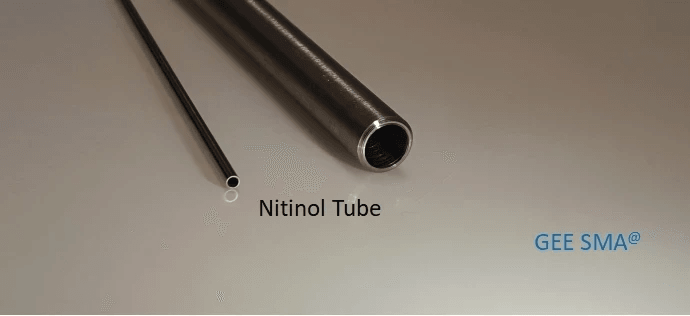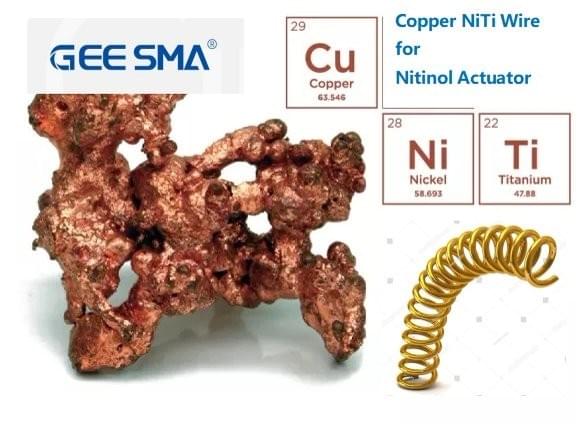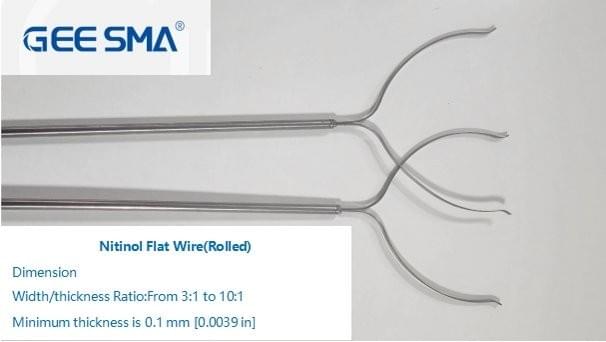Introduction
In the ever-evolving landscape of medical technology, SE508 nitinol emerges as a standout material, captivating the attention of engineers and healthcare professionals alike. This unique alloy, composed of nickel and titanium, boasts remarkable properties that make it ideal for a variety of applications in medical devices. From its flexibility to its biocompatibility, SE508 nitinol is revolutionizing the way we approach surgical instruments.
The Allure of SE508 Nitinol
SE508 nitinol is not just another metal; it's a game-changer in the realm of medical instruments. Its superelasticity allows for incredible deformation without permanent damage, making it perfect for intricate procedures where precision is key. Whether in SE508 nitinol endoscopic graspers or other surgical tools, this alloy provides both reliability and performance that can enhance surgical outcomes.
Why Biocompatibility Matters
When it comes to medical devices, biocompatibility is non-negotiable; materials must interact safely with human tissue to avoid adverse reactions. SE508 nitinol's biocompatible properties ensure that these nickel titanium surgical tools can be used with confidence in various surgical settings. By prioritizing biocompatible nitinol components, manufacturers can create devices that not only perform well but also safeguard patient health.
Superelasticity in Medical Instruments
The superelastic nature of SE508 nitinol opens up new avenues for innovation in medical instruments, particularly in endoscopy where flexibility is crucial. Imagine shape memory alloy endoscopy devices that adapt seamlessly to complex anatomical structures—this is the promise that superelastic nitinol holds. With enhanced maneuverability and resilience under stress, these instruments are setting a new standard for what’s possible in minimally invasive procedures.
Understanding SE508 Nitinol

SE508 Nitinol is a remarkable material that has revolutionized the field of medical devices. This nickel-titanium alloy is known for its unique properties, particularly superelasticity and shape memory, making it an ideal choice for a variety of surgical applications. As we delve into the intricacies of SE508 Nitinol, we'll uncover what sets it apart and how it enhances medical instruments.
What is SE508 Nitinol?
SE508 Nitinol is a specific grade of nickel-titanium alloy that exhibits exceptional mechanical properties, particularly in its ability to return to a predetermined shape when subjected to heat. This feature makes it especially useful in creating superelastic nitinol medical instruments that can withstand significant deformation without permanent damage. Its unique characteristics allow for innovative designs in various medical applications, including minimally invasive surgeries.
Composition and Mechanical Properties
The composition of SE508 Nitinol typically consists of approximately 55% nickel and 45% titanium, which contributes to its distinctive superelastic behavior and shape memory capabilities. The balance between these two elements is crucial; even slight variations can significantly affect performance characteristics such as elasticity and strength. The mechanical properties of SE508 Nitinol make it highly resilient under stress, allowing for the design of durable nickel titanium surgical tools that maintain their integrity even in challenging environments.
Applications in Medical Devices
SE508 Nitinol finds extensive use across various medical devices due to its biocompatible nitinol components and versatile nature. One prominent application includes SE508 nitinol endoscopic graspers, which rely on the material's flexibility and strength to navigate complex anatomical structures during procedures. Additionally, this alloy serves as the backbone for numerous shape memory alloy endoscopy devices, enhancing surgical precision while minimizing patient trauma through less invasive techniques.
Biocompatibility of Nitinol

Biocompatibility is a crucial factor in the development and use of medical devices, ensuring that materials used within the human body do not provoke adverse reactions. SE508 nitinol stands out as an exceptional candidate due to its unique properties, which allow it to interact harmoniously with biological tissues. The significance of biocompatible nitinol components cannot be overstated, as they play a vital role in enhancing patient safety and improving surgical outcomes.
Importance of Biocompatible Materials
In the realm of medical instruments, biocompatibility is paramount. Materials that are not biocompatible can lead to complications such as inflammation or rejection by the immune system, which can compromise patient health and recovery. SE508 nitinol, with its nickel-titanium composition, is designed to minimize these risks while providing excellent mechanical performance in various surgical applications.
The use of biocompatible materials like SE508 nitinol helps ensure that devices such as superelastic nitinol medical instruments can be safely implanted or used within the body without causing harm. This focus on compatibility fosters innovation in design and application, ultimately leading to better patient outcomes. Understanding the importance of these materials allows manufacturers to create tools that are not only effective but also safe for patients undergoing procedures.
SE508 Nitinol in Surgical Applications
SE508 nitinol has carved a niche for itself in various surgical applications thanks to its remarkable properties. Its superelasticity allows it to return to its original shape after deformation, making it ideal for intricate procedures where precision is key. For example, SE508 nitinol endoscopic graspers leverage this property effectively, enabling surgeons to navigate complex anatomical structures with ease.
Moreover, the adaptability and flexibility offered by nickel titanium surgical tools contribute significantly to their success in minimally invasive surgeries. Surgeons appreciate how these tools can maneuver through tight spaces while maintaining strength and reliability under stress conditions. This versatility positions SE508 nitinol at the forefront of modern surgical practices.
Case Studies of Successful Use
Several case studies highlight the successful integration of SE508 nitinol into medical practices across various fields. One notable example involves a series of minimally invasive surgeries using shape memory alloy endoscopy devices made from SE508 nitinol; these surgeries reported reduced recovery times and fewer complications compared to traditional methods. Surgeons noted that using superelastic nitinol medical instruments led not only to improved procedural efficiency but also enhanced patient comfort during and after surgery.
Another case involved cardiac stents crafted from biocompatible nitinol components; these stents demonstrated excellent patency rates over extended periods post-implantation without significant adverse reactions observed in patients. The combination of durability and safety offered by SE508 nitinol has established it as a preferred material for many critical applications within healthcare settings worldwide.
Through these case studies, it's evident that when properly utilized, SE508 nitinol can lead to transformative advancements in patient care—underscoring its importance within modern medicine's toolkit.
The Flexibility Factor

When it comes to medical instruments, flexibility is more than just a desirable trait; it's often essential for successful procedures. Superelastic SE508 nitinol has emerged as a game-changer in this regard, providing unparalleled adaptability in various surgical applications. This unique alloy allows for significant deformation without permanent change, making it ideal for intricate maneuvers within the human body.
Superelastic Nitinol and Its Benefits
Superelastic SE508 nitinol offers remarkable benefits that set it apart from traditional materials used in medical devices. Its ability to return to its original shape after deformation means that surgeons can navigate complex anatomical structures with ease and precision. Moreover, the inherent flexibility of superelastic nitinol medical instruments reduces the risk of injury to surrounding tissues during delicate procedures, enhancing overall patient safety.
The advantages extend beyond just maneuverability; superelastic SE508 nitinol also boasts excellent fatigue resistance and corrosion resistance. These properties ensure that nickel titanium surgical tools maintain their effectiveness over time, even under challenging conditions. As a result, healthcare providers can rely on these biocompatible nitinol components for consistent performance throughout their lifespan.
Flexibility in Endoscopic Graspers
One of the most notable applications of SE508 nitinol is in endoscopic graspers, where flexibility plays a critical role in achieving successful outcomes. These specialized tools must navigate tight spaces while maintaining a firm grip on tissue or objects within the body. The unique properties of superelastic SE508 nitinol allow for an impressive range of motion and adaptability during these intricate procedures.
Endoscopic graspers made from superelastic nitinol not only improve dexterity but also enhance control during operations such as biopsies or foreign object retrievals. Their ability to conform to various shapes ensures that surgeons can perform tasks with minimal trauma to surrounding tissues—an essential factor when working within sensitive areas like the gastrointestinal tract or respiratory system. As a result, these advanced graspers contribute significantly to improved patient outcomes and reduced recovery times.
Design Innovations with Nitinol
The introduction of SE508 nitinol has sparked a wave of innovative designs across various medical instruments, particularly those requiring flexibility and resilience. Engineers are now able to create shape memory alloy endoscopy devices that adapt dynamically during use, revolutionizing how surgeries are performed today. This innovation not only enhances functionality but also opens up new possibilities for minimally invasive techniques.
Moreover, the integration of biocompatible nitinol components into surgical tools facilitates improved sterilization processes and reduces the likelihood of adverse reactions within the body. Designers are continuously exploring ways to leverage the unique characteristics of nickel titanium alloys like SE508 nitinol to develop cutting-edge solutions tailored specifically for complex surgical tasks. Ultimately, these design innovations promise a future where medical instruments are not only more effective but also safer for patients.
Reliability in Extreme Conditions

Nitinol, particularly SE508 nitinol, has emerged as a game-changer in medical instruments due to its impressive performance in challenging environments. The unique properties of superelastic nitinol medical instruments allow them to maintain functionality under various stressors, making them ideal for use in demanding situations. As healthcare continues to evolve, the reliability of biocompatible nitinol components becomes increasingly crucial for ensuring patient safety and effective treatment outcomes.
Nitinol in Challenging Environments
When it comes to challenging environments, SE508 nitinol stands out for its remarkable adaptability and resilience. This nickel titanium alloy can withstand extreme temperatures and pressures without losing its shape or functionality, which is vital for medical devices used in unpredictable conditions. Whether it's a high-stakes surgical procedure or a complex endoscopic operation, the reliability of SE508 nitinol endoscopic graspers ensures that healthcare professionals can perform with confidence.
GEE SMA’s Role in Space Missions
Interestingly enough, GEE SMA has harnessed the properties of SE508 nitinol for applications beyond Earth—specifically in space missions. The lightweight yet robust nature of shape memory alloy endoscopy devices made from this superelastic material is perfect for the rigors of space exploration. By employing these innovative nickel titanium surgical tools, astronauts can conduct essential medical procedures even under the most extreme conditions encountered beyond our planet.
Performance of Nitinol Under Stress
The performance of SE508 nitinol under stress is nothing short of extraordinary; it retains its superelasticity even when subjected to significant deformation. This characteristic allows for remarkable flexibility and recovery capabilities that are essential for medical instruments operating within tight spaces or during intricate procedures. With its proven track record as a reliable choice for biocompatible nitinol components, SE508 nitinol is paving the way for advancements that enhance both surgical techniques and patient care.
Advancements in Nitinol Technologies

The world of medical technology is buzzing with excitement as advancements in SE508 nitinol technologies continue to reshape surgical practices. This innovative material, known for its superelastic properties and biocompatibility, is paving the way for a new generation of medical instruments. As we delve deeper into the innovations surrounding nickel titanium surgical tools and shape memory alloy endoscopy devices, it’s clear that SE508 nitinol is not just a trend but a transformative force in healthcare.
Innovations in Nickel Titanium Surgical Tools
Nickel titanium surgical tools have undergone remarkable innovations thanks to the unique properties of SE508 nitinol. These tools leverage superelasticity, allowing them to bend and flex without breaking, which enhances their usability during intricate procedures. Surgeons can now rely on these biocompatible nitinol components to perform complex operations with greater precision and reduced risk of damage to surrounding tissues.
In recent years, manufacturers have developed advanced designs that integrate SE508 nitinol into various surgical instruments, including forceps and retractors. These nickel titanium surgical tools are engineered for optimal performance while maintaining patient safety through their biocompatibility. The ongoing research into improving these instruments promises even more sophisticated applications that could redefine surgical standards.
Moreover, the incorporation of SE508 nitinol into surgical tool designs has led to lighter yet stronger instruments that reduce fatigue during long procedures. This innovation not only benefits surgeons but also enhances overall patient outcomes by facilitating quicker recovery times due to less invasive techniques. As we continue exploring advancements in this field, it’s evident that the future holds exciting possibilities for nickel titanium surgical tools.
Shape Memory Alloy Endoscopy Devices
The advent of shape memory alloy endoscopy devices marks a significant leap forward in minimally invasive surgery capabilities. Utilizing SE508 nitinol's unique properties, these devices can change shape when exposed to specific temperatures or stimuli, making them highly adaptable during procedures. This flexibility allows physicians to navigate complex anatomical structures with ease while minimizing trauma to patients.
SE508 nitinol endoscopic graspers exemplify this innovation perfectly; they combine precision with adaptability, making them ideal for delicate operations within confined spaces like the gastrointestinal tract or respiratory system. The superelastic nature of these graspers ensures they can withstand repeated use without compromising functionality or safety—an essential feature for any medical instrument designed for frequent sterilization and handling.
Looking ahead, we can expect further enhancements in shape memory alloy endoscopy devices as researchers explore new applications and designs tailored specifically for various medical specialties. With ongoing developments focusing on improving maneuverability and control through advanced engineering techniques, the future looks bright for these innovative devices powered by SE508 nitinol.
Future Trends in Nitinol Development
As we gaze into the crystal ball of medical technology trends, it's apparent that SE508 nitinol will play a pivotal role in shaping future innovations across various fields of medicine. The continued exploration of biocompatible nitinol components opens doors to new applications beyond traditional uses—think orthopedic implants or cardiovascular stents designed with enhanced flexibility and strength due to superelastic properties.
Emerging research focuses on improving manufacturing processes for nickel titanium alloys like SE508 nitinol, aiming at reducing costs while maintaining high-quality standards essential for medical applications. Additionally, advancements in 3D printing technologies may allow custom-designed instruments utilizing this remarkable material tailored specifically to individual patient needs—a game-changer in personalized medicine!
Ultimately, as healthcare continues evolving toward more efficient practices centered around patient care quality improvements through technology integration—SE508 nitinol will undoubtedly remain at the forefront driving innovation forward! With its versatility paving pathways toward groundbreaking solutions within medicine today—who knows what tomorrow holds?
Conclusion
In conclusion, SE508 nitinol stands out as a remarkable material that bridges the gap between innovation and practicality in the medical field. This versatile alloy, with its unique properties, has transformed how medical instruments are designed and utilized, particularly in minimally invasive procedures. From superelastic nitinol medical instruments to advanced shape memory alloy endoscopy devices, the applications of SE508 nitinol are vast and continually evolving.
The Versatility of SE508 Nitinol
The versatility of SE508 nitinol is evident in its ability to adapt to various surgical needs without compromising performance. Its superelasticity allows for dynamic movement and flexibility, making it ideal for applications such as SE508 nitinol endoscopic graspers that require precision and adaptability during procedures. Furthermore, the incorporation of biocompatible nitinol components ensures that these tools can be safely used within the human body without adverse reactions.
Enhancing Patient Outcomes with Nitinol
Enhancing patient outcomes is at the forefront of medical innovation, and SE508 nitinol plays a crucial role in this endeavor. The use of nickel titanium surgical tools made from this alloy enables surgeons to perform complex procedures with greater ease and accuracy, ultimately leading to shorter recovery times for patients. Moreover, the biocompatibility of these instruments minimizes complications post-surgery, contributing significantly to overall patient satisfaction.
The Future of Medical Instruments with Nitinol
Looking ahead, the future of medical instruments featuring SE508 nitinol appears bright and promising. As research continues into new applications for superelastic nitinol medical instruments and shape memory alloy endoscopy devices, we can expect even more groundbreaking developments that enhance surgical techniques and patient care. With ongoing innovations in design and functionality, SE508 nitinol will undoubtedly remain a cornerstone material in advancing modern medicine.

